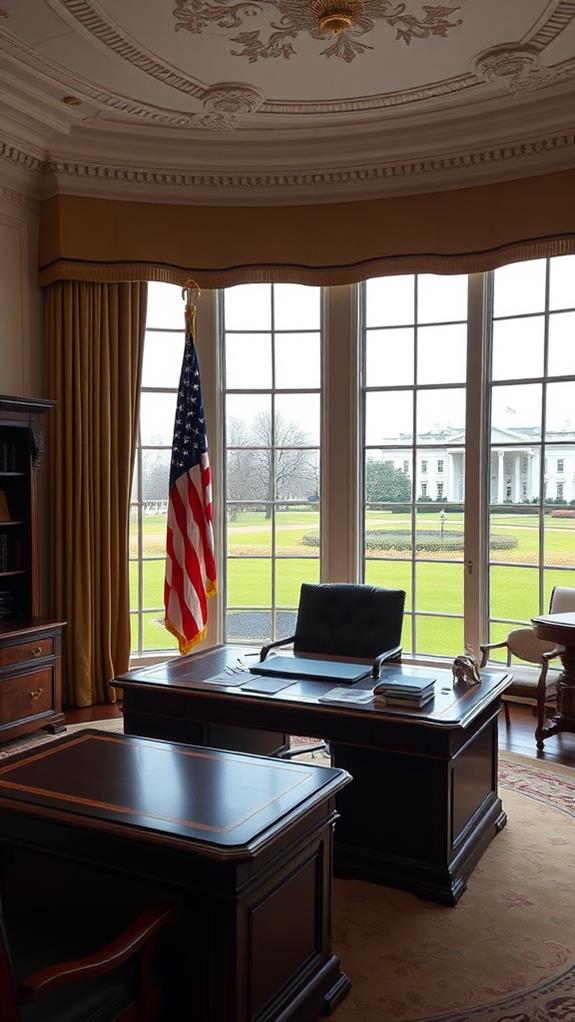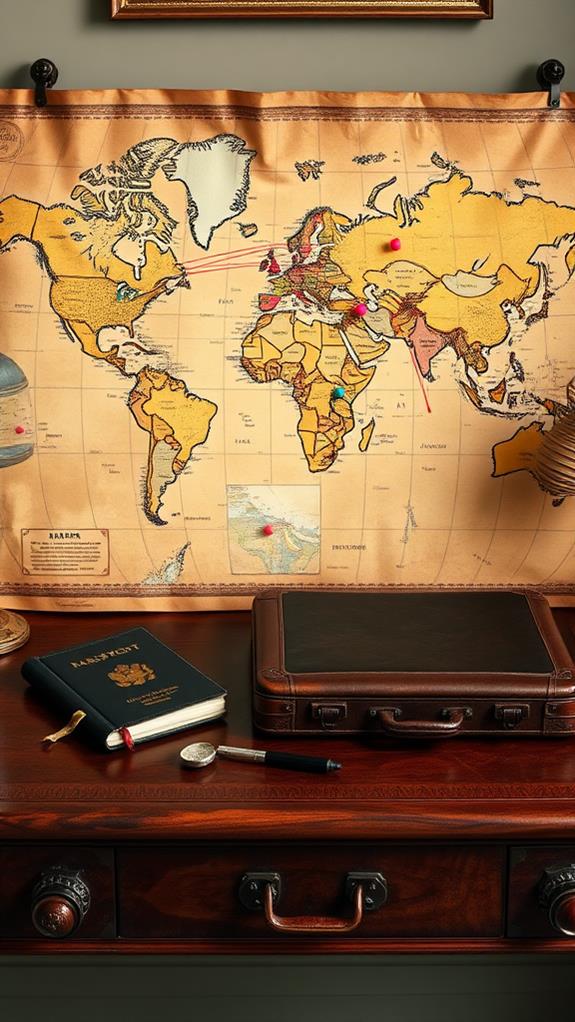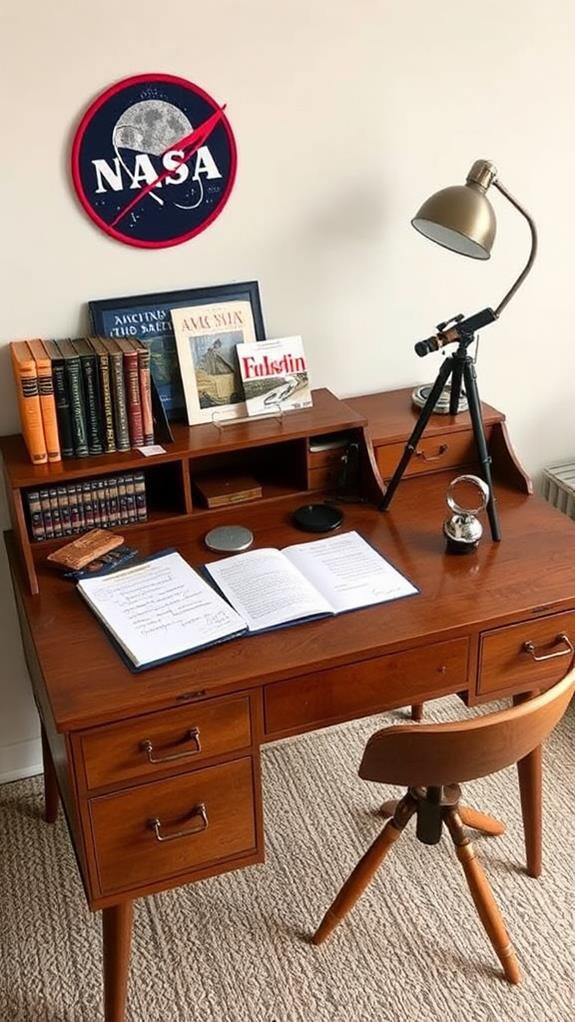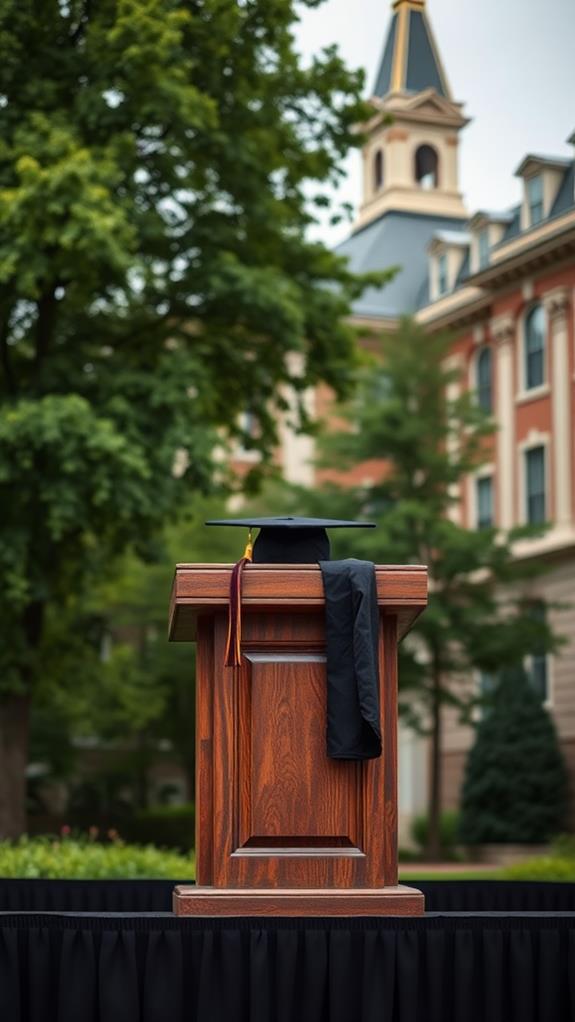Interesting Facts About Hillary Clinton You Never Knew
You'll discover surprising facts about Hillary Clinton that reveal her journey from a young Republican to a trailblazing Democratic leader. She supported Barry Goldwater in 1964 and was president of her college's Young Republicans Club. As First Lady, she broke tradition by establishing an office in the West Wing. Clinton visited 112 countries as Secretary of State, setting a new standard for diplomatic outreach. She's a Grammy-nominated author and the first female commencement speaker at Yale Law School. Clinton even wrote to NASA at age 14, expressing her desire to become an astronaut. These lesser-known details offer a glimpse into her multifaceted career and personal evolution.
This post may contain affiliate links. If you make a purchase through these links, I may earn a commission at no additional cost to you. Additionally, portions of this post may be generated using artificial intelligence (AI) technology. While we strive for accuracy, please be aware that AI-generated content may not always be perfect and should be fact-checked when necessary.
The Spatula Scoops
- Clinton initially supported Republican Barry Goldwater and was president of the Young Republicans Club at Wellesley College.
- She wrote to NASA at age 14 expressing a desire to become an astronaut, highlighting early awareness of gender barriers.
- As First Lady, Clinton was the first to establish an office in the West Wing, breaking tradition.
- She visited 112 countries as Secretary of State, averaging more than one country visit every two weeks.
- Clinton worked in an Alaskan salmon cannery post-college, gaining firsthand exposure to working-class issues.
Young Republican to Democratic Advocate

Hillary Clinton's political journey began with a surprising twist. You might not know that she initially supported Republican Barry Goldwater in 1964, showcasing her early interest in national politics. During her time at Wellesley College, Clinton even served as president of the Young Republicans Club, demonstrating her initial conservative political affiliations.
However, the tumultuous events of the 1960s reshaped Clinton's political ideology. In 1968, she made a significant shift, registering as a Democrat and supporting Eugene McCarthy's campaign against Lyndon B. Johnson. This change reflected the broader societal transformations occurring during that era.
A pivotal moment in Clinton's political evolution came when she actively protested in Boston following Martin Luther King Jr.'s assassination in 1968. This event marked a turning point in her commitment to civil rights and social justice. As a political science student, Clinton's experiences during this time deeply influenced her future career path.
Clinton's transformation from a young Republican to a Democratic advocate illustrates how personal beliefs can evolve alongside societal changes. Her journey exemplifies the complex nature of political ideologies and the impact of significant historical events on individual perspectives.
Unprecedented First Lady Office Location

You might be surprised to learn that Hillary Clinton was the first First Lady to have an office in the West Wing, a location traditionally reserved for senior staff and key advisors. Her choice of office placement, in close proximity to the Oval Office, symbolized a departure from the more ceremonial role of previous First Ladies. This unprecedented move allowed Clinton to be more directly involved in policy discussions and administration decisions, setting a new standard for the First Lady's role in governance.
West Wing Office Placement
While previous First Ladies traditionally worked from the East Wing, Hillary Clinton broke new ground by establishing her office in the West Wing of the White House. This unprecedented move positioned her closer to the center of power, allowing her to be more directly involved in policy discussions and the presidential administration.
You might not realize that Clinton's office was strategically located near the Oval Office and senior staff, granting her immediate access to key political affairs and decision-making processes. This shift symbolized a significant increase in visibility and authority for the role of First Lady, redefining expectations for future presidential spouses.
By placing herself in the West Wing, Clinton elevated the First Lady's position from a primarily ceremonial role to one of active participation in political matters. This decision set a precedent for future First Ladies, highlighting their potential engagement beyond traditional duties.
Clinton's West Wing office placement demonstrated her commitment to being an integral part of the administration, solidifying her influence and marking a turning point in the evolution of the First Lady's role within the White House.
Proximity to Oval Office
The unprecedented move of Hillary Clinton's office to the West Wing of the White House placed her in close proximity to the Oval Office. This strategic relocation notably impacted her role as First Lady, allowing her unprecedented access to the president and senior staff. You'll find that Clinton's West Wing presence revolutionized the traditional expectations of a First Lady's involvement in political affairs and policy-making.
Here's a breakdown of Clinton's unique office placement:
| Location | Advantages | Impact |
|---|---|---|
| West Wing | Close to Oval Office | Enhanced influence |
| Near senior staff | Access to key meetings | Increased policy involvement |
| Away from East Wing | Break from tradition | Redefined First Lady role |
| Central to operations | Real-time information | Shaped national issues |
This proximity to the center of power enabled Clinton to actively participate in discussions on vital national issues. You'll notice that her involvement in White House operations and policy initiatives was notably enhanced compared to previous First Ladies. By positioning herself in the West Wing, Clinton effectively reshaped the role of First Lady, emphasizing direct engagement in political affairs and demonstrating her commitment to influencing policy at the highest level.
Symbolism of Location Choice
Hillary Clinton's decision to relocate her office to the West Wing spoke volumes about her intentions as First Lady. You might not realize it, but this move was unprecedented and highly symbolic. By choosing to work in the West Wing, Clinton positioned herself at the heart of policy-making and decision-making processes.
The West Wing is where the action happens in the White House. It's home to the Oval Office and the Situation Room, placing Clinton in close proximity to senior staff and key advisors. This strategic location allowed her to have a more significant impact on Bill Clinton's administration priorities.
Clinton's choice broke with tradition and redefined the role of First Ladies. You see, previous First Ladies typically worked from the East Wing, which was more removed from day-to-day governance. By moving to the West Wing, Clinton signaled her desire for active involvement in shaping policy and influencing decisions.
This bold move set a new precedent for future First Ladies, emphasizing the potential for a more politically engaged role. It underscored Clinton's commitment to being a true partner in her husband's presidency, rather than a ceremonial figurehead.
Record-Breaking Global Diplomacy

Globetrotting diplomat Hillary Clinton set a remarkable record during her tenure as Secretary of State. She visited an astounding 112 countries in a single term, averaging more than one new country every two weeks. This unprecedented level of global diplomacy showcased Clinton's commitment to international engagement and strengthened U.S. foreign policy worldwide.
As she traversed the globe, Clinton made women's rights a central focus of her diplomatic efforts. You'll find that she pledged to combat gender-based violence and promote education for girls in numerous countries. Her tireless work extended beyond these issues, as she played a significant role in managing U.S. responses to various crises. Notable among these was her involvement in the operation that led to Osama bin Laden's capture.
Clinton's diplomatic prowess was particularly evident during events like the Arab Spring, where she negotiated key elements of U.S. foreign policy with world leaders. Her record-breaking travels and extensive engagement demonstrate the importance of face-to-face diplomacy in an increasingly interconnected world. Clinton's tenure as Secretary of State left an indelible mark on global affairs and set a new standard for diplomatic outreach.
Grammy Award-Winning Author

While her diplomatic achievements are impressive, you might be surprised to learn that Clinton's talents extend beyond the domain of politics. Hillary has also made a name for herself as a Grammy Award-winning author. In 1997, she won the Grammy for Best Spoken Word Album for her audiobook "It Takes a Village," which explores her views on children's development and community involvement in childcare.
Clinton's literary pursuits didn't stop there. She received another Grammy nomination in 2006 for her audiobook "Living History," an account of her time as First Lady and her early life. This book achieved remarkable commercial success, selling over 200,000 copies on its first day of release in 2003.
Following her 2016 presidential campaign, Clinton penned "What Happened," reflecting on her electoral defeat and the lessons learned. In 2019, she collaborated with her daughter Chelsea on "The Book of Gutsy Women," highlighting inspiring women's stories.
Clinton's writing career demonstrates her ability to engage audiences beyond the political sphere, showcasing her versatility as a public figure and author.
Childhood NASA Correspondence

During her childhood, long before her political career took shape, a young Hillary Clinton harbored dreams of space exploration. At 14, she wrote to NASA expressing her aspirations of becoming an astronaut. The response she received, however, illuminated the gender barriers prevalent in STEM careers at the time. NASA informed her that women weren't accepted into the astronaut program, a fact that would later shape Clinton's understanding of women's rights.
This childhood correspondence with NASA reveals three significant aspects of Clinton's character and experiences:
- Her lifelong ambition to break barriers and pursue challenging goals
- Early exposure to gender-based limitations in professional fields
- The seeds of her future advocacy for equal opportunities in various sectors
Clinton's memoir, "Living History," recounts this formative incident, highlighting its impact on her perspective. You'll find that this early interest in space exploration foreshadowed her later efforts to champion women's rights and opportunities. The anecdote has since become a talking point in discussions about gender equality in STEM fields, underscoring the importance of representation and access for aspiring female scientists and explorers.
Alaskan Salmon Cannery Experience

From the stars to the sea, Hillary Clinton's early experiences shaped her worldview. After graduating from Wellesley College in 1969, she ventured to Alaska for a post-college employment opportunity that would prove to be a formative experience. You might be surprised to learn that Clinton worked in a salmon cannery, engaging in hard physical work that contrasted sharply with her later political career.
This manual labor job exposed Clinton to working-class issues firsthand. Though she was ultimately fired for being too slow, the experience left a lasting impression. It's often cited as evidence of her commitment to working Americans and her willingness to tackle tough jobs.
| Aspect | Impact on Clinton |
|---|---|
| Physical Labor | Appreciation for blue-collar work |
| Job Performance | Understanding of workplace challenges |
| Social Exposure | Insight into working-class struggles |
| Career Perspective | Broadened view of employment landscape |
| Political Influence | Informed policies on labor issues |
Clinton's brief stint in the salmon cannery became a cornerstone of her narrative, demonstrating her early exposure to diverse work environments. This experience would later inform her understanding of labor issues and shape her political platform, emphasizing the importance of firsthand knowledge in policymaking.
Yale Law School Trailblazer

At Yale Law School, Hillary Clinton shattered barriers as the first female commencement speaker in the institution's history. You'll find her groundbreaking legal achievements during this time laid the foundation for her future career in public service. Clinton's exceptional performance at Yale, coupled with her involvement in high-profile legal cases, positioned her as a trailblazer in the field of law and politics.
First Female Commencement Speaker
Hillary Clinton's trailblazing journey began long before her political career. You might not know that she made history as the first female commencement speaker at Wellesley College in 1969. Her commencement speech garnered significant attention, setting the stage for her future in public service.
Clinton's academic excellence continued at Yale Law School, where she honed her legal skills and developed her commitment to children's rights. Her time at Yale was marked by involvement in vital events, including work on the Nixon impeachment inquiry with the House Judiciary Committee.
Clinton's experiences at Yale shaped her future in three key ways:
- Developed her legal expertise
- Strengthened her dedication to public service
- Positioned her as a trailblazer for women in law and politics
In 1973, Clinton graduated from Yale with a Juris Doctor degree, further cementing her status as a pioneer. This achievement paved the way for her future roles in government and advocacy. Clinton's early accomplishments demonstrate how her commitment to public service and academic excellence laid the foundation for her influential career in politics and law.
Groundbreaking Legal Achievements
Building on her early achievements, Clinton's time at Yale Law School marked a series of groundbreaking legal accomplishments. You might not know that she received her Juris Doctor degree in 1973, focusing on children's rights and community activism. During her studies, Clinton served on the Yale Review of Law and Social Action, demonstrating her commitment to public interest law.
Her legal prowess didn't go unnoticed. In 1974, Clinton played a significant role in the impeachment inquiry of President Nixon as a member of the House Judiciary Committee during the Watergate scandal. This experience provided her with invaluable insight into the highest levels of government.
After graduation, Clinton's dedication to children's welfare led her to the Children's Defense Fund, where she advocated for children's rights. This work established her as a trailblazer for women in law and laid the foundation for her future political career.
Clinton's groundbreaking legal achievements at Yale and her subsequent work showcased her exceptional skills and passion for public service. These experiences shaped her into the influential figure she'd become in American politics and law.
What Are Some Similar Traits Between Abigail Adams and Hillary Clinton?
Abigail Adams and Hillary Clinton share remarkable traits as trailblazing women who shaped political landscapes. Both advocated for equality and used their platforms to influence critical issues of their time. Among the interesting facts about abigail adams is her push for women’s rights, echoing Clinton’s modern efforts for gender equality and social reform.
Wellesley Commencement Speech Pioneer

A groundbreaking moment in women's education occurred in 1969 when Hillary Clinton delivered the first-ever student commencement address at Wellesley College. As a political science graduate with high honors, Clinton's speech resonated with the feminist movements of the time, focusing on finding one's voice and advocating for change.
Her address gained national attention, highlighting women's growing role in politics and society. It's often cited as a pivotal moment in Clinton's career, showcasing her dedication to women's rights and empowerment. The speech received mixed reactions, but it solidified her status as a public figure.
Clinton's Wellesley commencement speech is significant for three reasons:
- It broke barriers for women in higher education
- It aligned with second-wave feminism's momentum
- It set the stage for Clinton's future in politics and advocacy
You might not have known that this speech was a defining moment in Clinton's journey. It demonstrated her eloquence and commitment to social change, themes that would become central throughout her career. The address remains a representation of her early influence on women's empowerment and political engagement.
Frequently Asked Questions
What Is Hillary Clinton's Favorite Book?
You might be curious about Hillary Clinton's favorite book, but it's not easy to pinpoint just one. She's known to be an avid reader with diverse tastes. However, she has mentioned her love for "The Brothers Karamazov" by Fyodor Dostoevsky. Clinton's also expressed admiration for "The Poisonwood Bible" by Barbara Kingsolver and "Clan of the Cave Bear" by Jean M. Auel. Her reading preferences seem to span classic literature, contemporary fiction, and historical novels.
Does Hillary Clinton Have Any Hidden Talents or Hobbies?
While Hillary Clinton's public persona dominates, you might be surprised by her hidden talents and hobbies. She's an avid reader and crossword puzzle enthusiast, often tackling the New York Times puzzle. You'll find she's also a skilled gardener, tending to her own vegetable patch. Clinton's lesser-known passion for yoga helps her maintain balance in her hectic life. Additionally, she's a talented mimic, known for her spot-on impressions of political figures. These private pursuits offer a glimpse into Clinton's multifaceted personality.
What Was Hillary Clinton's First Job After College?
After graduating from Wellesley College in 1969, you might be curious about Hillary Clinton's first job. She didn't immediately start her legal career. Instead, Clinton worked as a staff attorney for the Children's Defense Fund in Cambridge, Massachusetts. This role allowed her to advocate for children's rights and gain valuable experience in public service. She also briefly worked for the House Judiciary Committee during the Watergate scandal before moving to Arkansas to teach law and begin her political journey.
How Many Languages Does Hillary Clinton Speak?
You might be surprised to learn that Hillary Clinton primarily speaks English fluently. While she's studied other languages, she's not known to be multilingual. She's taken French classes and can manage some basic Spanish phrases, but she's not considered proficient in either. During her time as Secretary of State, she relied on interpreters for international communication. It's worth noting that language skills aren't a requirement for high-level political positions, as professional interpreters are always available when needed.
Has Hillary Clinton Ever Considered Running for a Non-Political Office?
You might wonder if Hillary Clinton has considered non-political roles. While there's no public record of her pursuing non-political offices, she's taken on various non-elected positions. After her tenure as Secretary of State, she joined the Clinton Foundation, focusing on global issues. She's also authored books and given paid speeches. Clinton's career has primarily centered on politics, but she's demonstrated versatility in her post-government work, engaging in philanthropy, writing, and public speaking.





